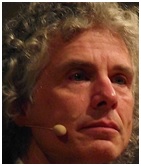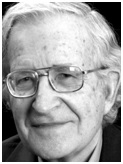|
 |
|
 |
Steven Pinker - Psychology and Learning
Steven Pinker (1954- )
Canadian psychologist (pictured right). Professor at Harvard University and best-selling author.
His most famous book is… The Blank Slate (2002) – see point 3 below.
What does he teach us about psychology and learning? 1. Inherited intelligence Pinker’s first best-seller was The Language Instinct (1994). This popularized the belief of another famous psychologist, Noam Chomsky (1928- ), pictured right, that heredity (from your genes) plays a significant role in learning language. Heredity limits how much influence parents and teachers can have on their children and students. 2. Evolution makes minds Pinker is an evolutionary psychologist who believes that our mind has developed to ensure our survival (as Richard Dawkins , pictured right, also argued in his book, The Selfish Gene). But we can't be purely selfish because we depend on others. So we must:
But such equality doesn’t mean that people end up the same, because of differences in ability and effort. 3. We are more than our experiences In his book, The Blank State (2002), Pinker rejects the idea of the philosopher, John Locke, pictured right, that our mind is like a blank page that is developed solely by experience and learning. The mind, says Pinker, is also influenced by evolution and your genes (see point 2).
4. The brain is a computer In another book, How the Mind Works (1997), Pinker likens the mind to a
computer that deduces the implications of facts received from our:
To solve specific problems, the mind uses:
It's not all in the genes.
Key quote on politics Commitment to political equality is not an empirical claim that people are clones.
|
|
|
||
|
|
|
||
|
||
| Copyright © wisdomtowin.com All Rights Reserved | ||
|






